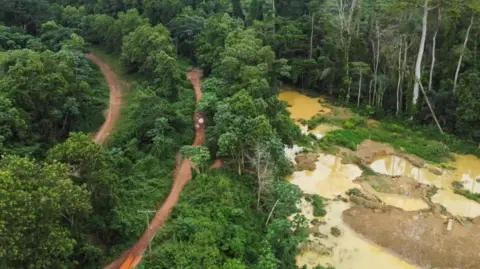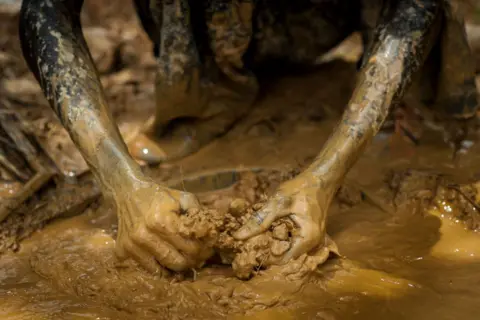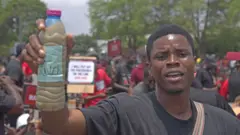 Reuters
ReutersWater from a polluted river in Ghana was so thick and discoloured that an artist was able to use it as paint to depict the environmental devastation caused by the illegal gold mining that has spread like wildfire in the resource-rich West African state.
Mercury is increasingly being used to extract gold by miners digging on a massive scale in forests and farms, degrading land and polluting rivers to such an extent that the charity WaterAid has called it “ecocide”.
“I could actually paint with the water. It was so bad,” Israel Derrick Apeti, better known as Enil Art, told the BBC.
He and his friend Jay Sterling visited the Pra River – around 200km (125 miles) west of the capital, Accra – to make a point about the environmental catastrophe unfolding because of “galamsey”.
This is the term used by locals to describe the illegal mining taking place at thousands of sites around the country – including the forested regions famous for their cocoa farms, as well as their vast gold deposits.
The West African state is the world’s sixth-biggest gold exporter, and the second-biggest cocoa exporter.
Demonstrators recently took to the streets of Accra to demand that the government take action to end the illegal mining. The police responded by detaining dozens of protesters accused of holding an illegal gathering. They were later released as anger grew over the arrests.
The hashtags #stopgalamseynow and #freethecitizens were used to galvanise young people across Ghana and the diaspora, particularly in Canada and the UK, to voice their concerns.
Apeti told the BBC that he had decided to contribute to the campaign through art.
“What is art for?” he said, adding: “On our way to the river, I just thought I could perhaps paint with the polluted water. It just came to me like that. So, we got there, I tried it and it worked out.”
Communities along the river – one of the biggest in Ghana – lamented to Apeti that the water was “once so clean that you could see the fish and crocodiles that lived in it”, but it had been transformed “into a yellowish-brown body of water”.
Ghana’s music stars have also thrown their weight behind the campaign.
Black Sherif – who hails from Konongo town in the Ashanti region, which has been badly affected by the illegal mining – stopped his set at The Tidal Rave Concert in Accra earlier this month to show a video of the devastation.
Truth Ofori, who was part of Black Sherif’s set, then sang a patriotic song called “This is our home”, while Stonebowy used his set to perform “Greedy Men”, which targeted those behind galamsey.
 Tidal Rave/Kelvin Buckman
Tidal Rave/Kelvin BuckmanThe devastation has been caused by the fact that the nature of illegal mining has changed – previously, young unemployed men dug with picks and shovels, or their bare hands, to search for gold.
They also relied on panning – the washing of sediment through a sieve so the gold settles at the bottom.
But Chinese businessmen – who first moved to Ghana around 18 years ago – have made it a more sophisticated industry.
They are accused of ignoring environmental concerns and taking to heart an age-old saying: “There is no land in Ghana which doesn’t have gold, even in the top soil. Ghana is gold.”
Indeed, during colonial times the country was known as the Gold Coast.
Some local businessmen and politicians are widely suspected to have joined them in what has been dubbed “the mad gold rush”, buying out cocoa farms and turning them into illegal mining sites.
They have also been accused of using intimidation if a farmer refuses to sell by digging up footpaths, and forcing them to eventually give up the land.
An estimated 4,726 hectares of land – more than the size of European cities like Athens and Brussels – have been destroyed in seven of the country’s 16 regions, and 34 of its 288 forest reserves, Ghana Forestry Commission head John Allotey was quoted as saying in August.
 Getty Images
Getty ImagesAgricultural development consultant Dr John Manful told the BBC that “precious, valuable land” in the forest belt had been destroyed by the gold-seekers.
“Illegal small-scale mining has been taking place for decades in Ghana. However, in recent years, it has been getting out of control, having catastrophic effects,” he said.
The mining has led to the felling of trees, and the clearing of vast areas of forest vegetation. Excavators are then used to dig out the top soil and subsoil.
The soil is then deposited at gold-washing plants stationed in rivers, and water is pumped to wash the soil and crushed stones.
During the washing process, various chemicals, including mercury and cyanide, are used to help extract the gold from the soil, polluting big and small rivers.
Highlighting the dangers of this, Dr George Manful, a former senior official in Ghana’s Environmental Protection Agency, said: “Mercury can remain in water for up to 1,000 years. The water in these rivers is so turbid that it is undrinkable.”
In an interview with local broadcaster Joy FM, he also pointed out that mercury could affect the entire food chain, as it accumulates in fish and can enter crops irrigated with the water.
“We are slowly poisoning ourselves,” Dr Manful added.















